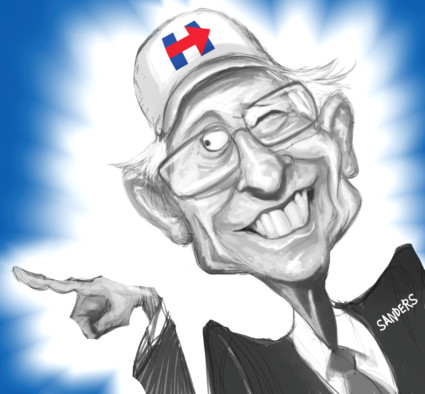
They are the odd couple of presidential campaigners: A charmless but effective control freak and a reckless but lovable shambles. Together, their extreme discomfort has been clear — for more than a year they couldn’t stand each other’s company. Now they apparently understand how much they need one another.
When Hillary Clinton and Bernie Sanders campaigned in Portsmouth, New Hampshire, on Tuesday, the scene was just as forced as you might have expected. “Secretary Clinton has won the Democratic nominating process,” Sanders barked as the Hillary crowd cheered wildly. “And I congratulate her for that.” At this point he clapped her on the shoulder like he was shoving her into the crowd. For a brief moment, Hillary stopped her bobble-head routine of nodding rhythmically while staring glass-eyed into the middle distance.
Awkwardness is the hallmark of these two candidates who deliver their applause lines with all the subtlety of tanks shelling their own supporters. Sanders said he was proud to stand with Hillary, but if that was his happy face, you’d hate to see him angry. Hillary thanked her introducers like she was denouncing them for all to see.
As they engaged in a ritual hug, Hillary murmured into his ear: “That’s great. That was so great.” At which point, the paths of these two great rivals immediately forked. Hillary continued to march Bataan-style towards an apocalyptic general election. Meanwhile, Sanders began to mop the sweat from his head with a white handkerchief. Perhaps he could predict what his most vocal supporters were already tweeting about his “sellout”.
You could almost forgive the Bernie bros for their bitterness and disbelief. Hillary and Sanders last shared a stage in April, just before the New York primary, when they quickly got down to their favourite pastime: Eviscerating one another. “Does Secretary Clinton have the experience and the intelligence to be a president? Of course she does,” Sanders started out meekly. “But I do question her judgement. I question a judgement, which voted for the war in Iraq, the worst foreign policy blunder in the history of this country, voted for virtually every disastrous trade agreement which cost us millions of decent paying jobs.”
Hillary returned the compliment, saying that Sanders was barely qualified to be interviewed by the New York Daily News.
“Talk about judgement and talk about the kinds of problems he had answering questions about even his core issue, breaking up the banks,” she began. “When asked, he could not explain how that would be done and when asked about a number of foreign policy issues, he could not answer about Afghanistan, about Israel, about counterterrorism, except to say if he’d had some paper in front of him, maybe he could.”
And the pundits wonder why so many Sanders voters have been slow to reconcile themselves to Hillary as their nominee.
After defeating her rival in a pyrrhic victory that felt so familiar to anyone who can recall the 1990s, Hillary last week adopted key parts of the Sanders agenda in a brazen political move that either represents a complete reversal or an insincerely token gesture. Who knows?
The payoff is already clear. The latest NBC/Wall St Journal poll shows that Sanders supporters are warming up to Clinton as their nominee: 45 per cent of his supporters now have a positive view of her, compared to just 38 per cent last month. The feelings are lopsided in reverse: 60 per cent of Hillary supporters have a positive feeling towards Sanders, suggesting Hillary has a long way to go to bring the Sanders voters fully on board this summer.
As bad as this is, the situation on the Republican side is even worse. According to a recent Pew poll, 85 per cent of Sanders supporters will vote for Hillary, while 9 per cent will vote for Trump and 6 per cent say any other candidate. In contrast, among GOP supporters of the many candidates who faced down Trump in the primaries, 77 per cent will vote for Trump while 14 per cent will vote for Hillary and another 9 per cent say any other candidate.
How bad is that 14 per cent anti-Trump vote inside the Republican party? Four years ago, just 4 per cent of Romney’s GOP rivals supported Obama.
Then again, a serious effort at outreach and reconciliation — the kind that Trump is pathologically incapable of undertaking — can succeed. “It’s no secret that Hillary Clinton and I disagree on a number of issues,” Sanders said as part of his ringing endorsement. “That’s what this campaign has been about. That’s what democracy is about.”
The challenge for Sanders and his supporters is to put those disagreements behind them, in support of what the vanquished candidate modestly called “the most progressive platform in the history of the Democratic party”. Whether or not Hillary campaigns and governs on this platform is anyone’s guess. In the meantime, everyone can agree that — like the signs say — they are Stronger Together, if not actually Closer Together.
— Guardian News & Media Ltd
Richard Wolffe is chief digital and marketing officer at Global Citizen, a non-profit organisation dedicated to ending extreme poverty.








